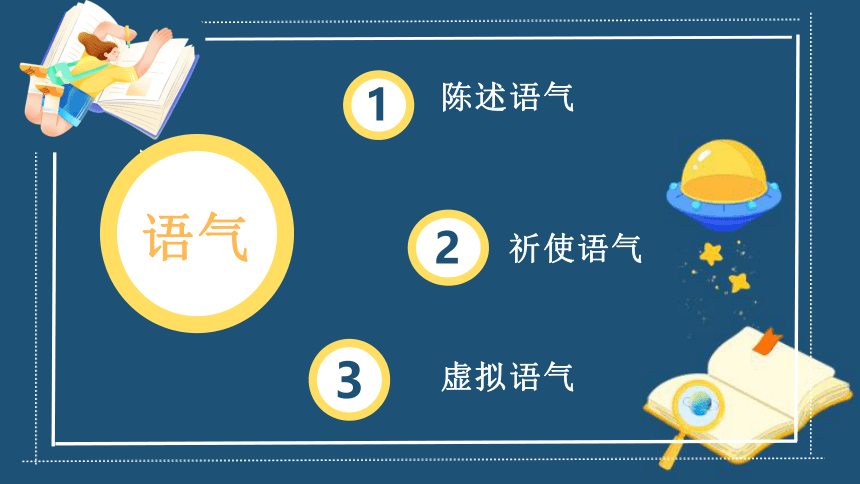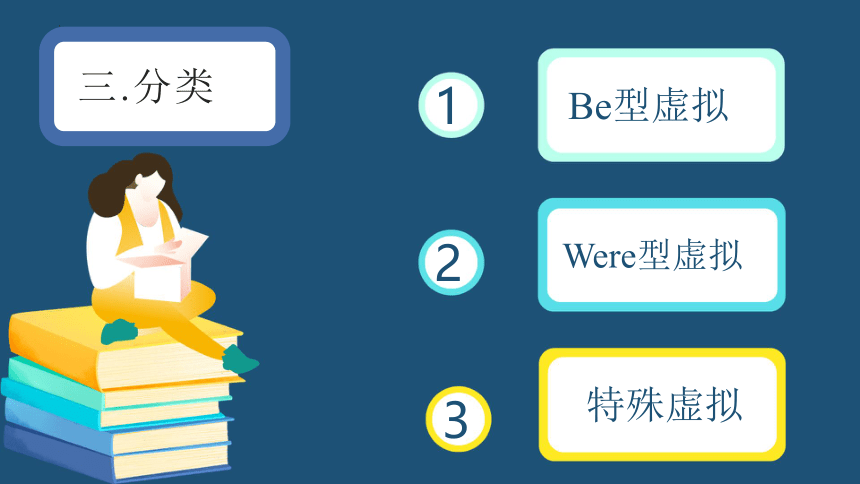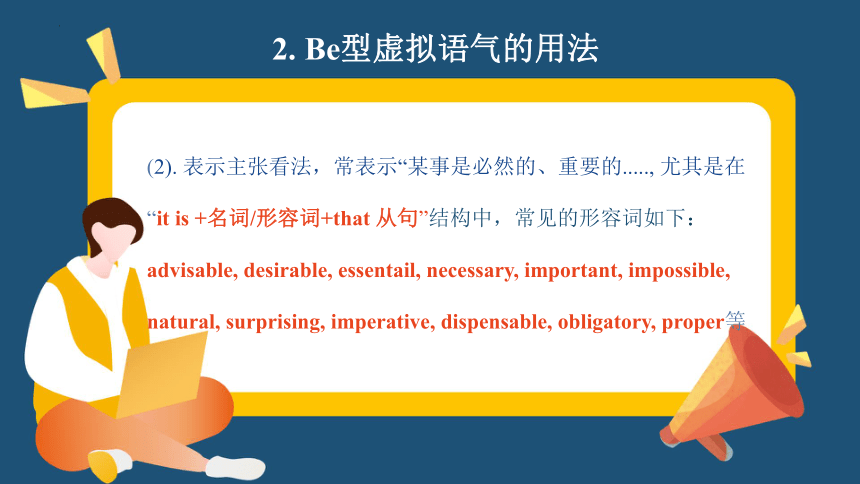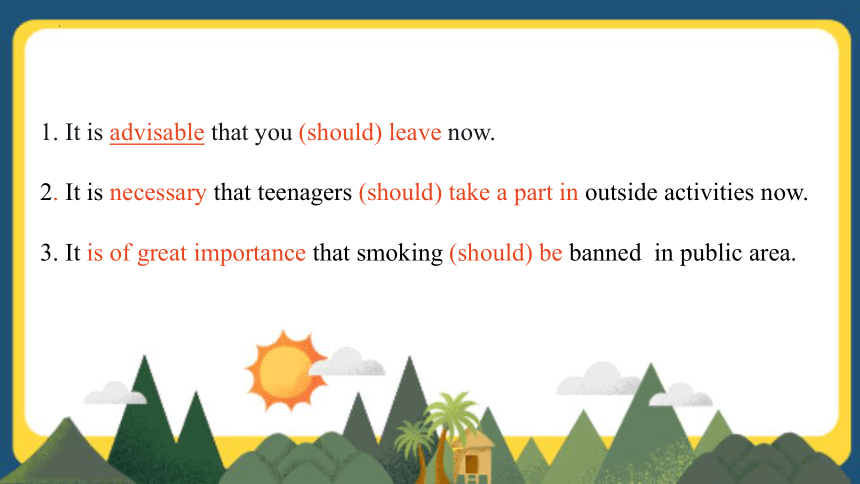新概念英语第三册虚拟语气课件(共45张PPT)
文档属性
| 名称 | 新概念英语第三册虚拟语气课件(共45张PPT) |

|
|
| 格式 | pptx | ||
| 文件大小 | 11.8MB | ||
| 资源类型 | 教案 | ||
| 版本资源 | 新概念英语 | ||
| 科目 | 英语 | ||
| 更新时间 | 2023-10-05 18:27:13 | ||
图片预览












文档简介
(共45张PPT)
虚拟语气
Subjunctive Mood
v
1
陈述语气
v
3
虚拟语气
语气
v
2
祈使语气
虚拟语气表示说话人的主观愿望、猜疑、建议或与事实不符的假设等,而不表示客观存在的事实。虚拟语气是由句中的谓语动词的特殊形式表示出来的。虚拟语气可用于状语从句,名词性从句,定语从句及其他结构中。
二. 什么是虚拟语气
1
2
3
Be型虚拟
Were型虚拟
特殊虚拟
三.分类
Be型虚拟
1. 形式:should+动词原形,should 可省略
例:They demanded that the government (should) take steps to rectify the situation.
2.Be型虚拟语气的用法
(1). 表示“建议、要求、命令”等意义词语之后的宾语从句用be型虚拟,常见词如下:demand, desire, insist, order, ask, command, propose, recommend, suggest, require, request, 等。
1. The doctor suggested that he (should) eat more fruits and vegetables.
2. The boss ordered that we (should) finish all the work before 5:00 pm.
3. Mother insisted that John (should) go to bed at 9 o’clock.
4. We demand that the meeting (should) be postponed.
补充: 有时所见到的不一定是上述动词引导的宾语从句,而是由上述动词变体后所引导的主语从句(it 做形式主语,如: it is suggested/ advised/ requested/ ordered/ proposed that ...)、表语从句或同位语从句。
例句:
1. It is required that the students (should) learn a foreign language.
2. The requirement is that all the equipment in the meeting room (should) be checked twice.
3. We didn’t stand for his proposal that the meeting (should) be postponed.
主语从句
表语从句
同位语从句
注意:suggest 和insist
当suggest作“ 暗示、表明、说明”讲, insist 作“坚持说”讲,后面一般是客观事实,不需要用虚拟。
1. We all suggest that a lab (should) be built.
2.Her expression suggests that she is angry.
3. He insisted that we (should) find the source of the river.
4. She insisted that she had done nothing wrong.
她坚持说她没有做错事。
我们建议建一个实验室。
她的表情说明她生气了。
他坚持主张找到河流的源头。
5. 他坚持说在那场事故发生之前,他从未离开过房间。(翻译成英文,insist)
练习题
1. John suggested that Jack a new chair. (buy)
(should) buy
2. He strongly recommended that we to that restaurant for dinner. (go)
He insisted that he had never left the room before that accident.
(should) go
3. His behavior at the party suggests that he a crush on the girl in blue. (have)
4. He insisted that they out of the house before the fire spread. (get)
(should) get
has
2. Be型虚拟语气的用法
(2). 表示主张看法,常表示“某事是必然的、重要的....., 尤其是在“it is +名词/形容词+that 从句”结构中,常见的形容词如下:advisable, desirable, essentail, necessary, important, impossible, natural, surprising, imperative, dispensable, obligatory, proper等
1. It is advisable that you (should) leave now.
2. It is necessary that teenagers (should) take a part in outside activities now.
3. It is of great importance that smoking (should) be banned in public area.
2. Be型虚拟语气的用法
(3). 表示”恐怕,担心,万一,以免“等,例如:if, lest, in case, for fear that等,后面的从句用(should)+动词原形来虚拟。
例句:
1. He took his raincoat with him in case it (should) rain
2. He took his raincoat with him for fear that he (should) be caught in the rain.
(4). Be型虚拟还用于表示“祝愿”的特殊结构,通常是May +主语+动词原形。
例如: May you be happy.
Were型虚拟
1. 表达与事实情况相反、未曾实现的主观愿望,
2. 表现形式如下:
(1). wish 引导的宾语从句,表示“希望”,用过去式(did, be动词用were)表示对现在情况的虚拟,用过去完成式(had done) 表示对过去情况的虚拟,用过去将来式(would/should +动词原形)表示对未来情况的虚拟。
3. were型虚拟的用法
①. I wish I were a bird.
②. I wish you came here now.
④. I wish he could come to help me with my paper, but he will go on bussiness tomorrow.
③. I wish that I had passed the final exam.
对过去情况的虚拟
对现在情况的虚拟
对将来情况的虚拟
(2). if only 引导的感叹句,表示“要是...就好了”用过去式表示对现在的虚拟,用过去完成式(had done) 表示对过去情况的虚拟,用过去将来式(would/should +动词原形)表示对未来情况的虚拟。。
① If only she were here at this moment.
②If only I hadn’t made this mistake.
③If only you would attend my wedding.
练习
①. 要是他没有忘记帮我买书就好了。
②.要是他明天帮我打扫卫生就好了。
If only he hadn’t fogotten to buy me books.
If only he would help me clean up tomorrow.
拓展
1、在only if 中,副词only是中心词, 而从属连接词if只用来连接从句,因此,它表示“只有……(才);只有在……的时候,唯一的条件是……”的意思。only if 有时也写成only…if,表示唯一的条件,但是意思不变。
You can make progress only if you are modest.
惟虚心乃能进步。
例:
Only if 的用法
Only if I get a job will I have enough money to go to school.
Only if presented in this way can your idea get over to the audience.
例:
若置于句首的only if不强调“唯一性”或“排他性”,比如当其中的only表示just或as recently as等意思时,此时其后的句子则不用倒装。
Only if 条件从句在前,中间无逗号时主句要倒装。
(3). would rather, would sooner, prefer, had rather , 引导的宾语从句,“宁愿,但愿”,谓语动词多用过去式(did, be动词用were)表示对现在或将来的虚拟, 用过去完成式(had done)表示对过去的情况的虚拟。
① I would rather you came here now.
② I would rather he hadn’t told you the truth.
③ I would rather you went tomorrow.
用过去式表将来
(4). as if /as though 引导的状语从句,表示“似乎......, 好像......,”与事实情况相反或几乎不大可能发生。对现在情况的虚拟用过去式(did, be动词用were),对过去情况的虚拟用完成式(had done)
例:
① She speaks as though she were sick.
② He talked about the film as if he had seen it before.
③ It seems as if the meeting would never end.
注意: 如果as if /as though 后面跟的是事实或者近乎事实,就不需要用虚拟。
if条件句及主句虚拟
if引导的条件句分为真实条件句和非真实条件句,非真实条件句的主句和从句都要用虚拟语气,表示根本不存在的情况或可能性很小的假设。
①. If he were to come here, he would tell us about it.
②. If I had seen the film, I would have told you about it.
③. If he studied at this school, he would know you well.
将来
过去
现在
if引导非真实条件句的用法
If I had any money with me,I could lend you some.
1. If I had enough money, I myself a computer.
2. If I should see him tomorrow, I him to have a dinner.
3. If he my advice,he would not have made such a mistake.
练习
had taken
would invite
(invite)
(take)
(buy)
would buy
4. If I had got there earlier,I her.
would have met
(meet)
5. If she were to be here next Monday,I her about the matter.
(tell)
would tell
(have)
6. If I any money with me now, I could lend you some.
had
7. 如果我是你,我就会邀请他去看电影。(中译英)
8. 如果Mary 提醒她拿书包, 她就不会迟到了。(中译英)
If I were you, I would invite him to go to the cinema.
If Mary had reminded her to take her bag, she wouldn’t have been late.
1. would/could/ should/ might 意义有区别
注意
2. 错综时间虚拟条件句/混合型虚拟条件句
通常情况下,在非真实条件句中的主句和从句所指的时间是一致的,主从句的谓语动词要么都是与过去事实相反, 要么与现在事实相反。但是有些条件句主句谓语和从句谓语表示的动作在时间上不一致,这类句子被称为错综时间虚拟条件句/混合型虚拟条件句。这时需要根据上下文的意思采用不同的谓语动词形式。
会
能够
应该
也许
①. If you had worked hard, you would be very tired.
②. If you followed my advice now, you would successed in the final exam next week.
③. If her husband had not been killed in the war, she would not help others with the housework.
错综时间虚拟条件句/混合型虚拟条件句
虚实混用
有的部分是真实的,有的部分是虚拟的,非真实的部分用虚拟,真实部分用正常的语法形式。
If I had been at the concert yesterday , I should have met the famous singer. But I failed to get a ticket.
3. 倒装结构
if从句中如果有were, should, had时可以省略if, 将were, should, had 倒装至主语之前。
① If I were you, I would apply for the job.
→Were I you, I would apply for the job.
②If you had caught the train, you wouldn’t have been late .
→Had you caught the train, you wouldn’t have been late .
③If she should arrive there in advance, I would show him around London.
→Should she arrive there in advance, I would show him around London.
4.含蓄虚拟条件句
有时假设的情况并不用条件从句表示出来,而是通过一个介词/介词短语或其他方式,但意思和条件句差不多,这种句子被称为含蓄条件句。这种句子也需要用到虚拟语气,常见的词和短语有:without, but for (要不是,如果没有)、but that(要不是), otherwise(否则), or, but等。
①. Without air, there wouldn’t be living things in the world.
②. But for your advice, I would have failed.
③. He felt very tired yesterday, or he would have helped you.
were it not for+名词/名词短语、 had it not been for+名词/名词短语,这两个结构也是倒装后的形式,意思是”要不是......” 还原成if 引导的虚拟条件句如下:
①. Were it not for peace, we could not live in a happy life.
If it were not for peace, we could not live in a happy life.
②. Had it not been for your help, I would have gone bankrupt.
If it had not been for your help, I would have gone bankrupt.
特殊虚拟结构
(1). It is (high/about) time...句型中,从句的谓语动词用过去式或者用should(不可省略)+动词原形,意思是该做某事的时间到了...
例:
It is high time we should go to bed.
It is high time we went to bed.
(2). 动词intend, mean, plan, want, expect, hope使用虚拟语气,用过去完成式+动词不定式,表示”过去想做却没做的事“。
例: I had intended to attend the meeting, but I was ill.
特殊虚拟结构
一、根据括号中所给单词的适当形式填空
1. If it were to rain, we the match. (call off)
would call off
3.The general ordered that the troops .
2.He insisted that Jennie him to dancing school.
4.He insisted that he innocent.
(attack)
(should) attack
(should) send
(send)
(be)
was
5. It is essentail that you the medicine. (take)
(should) take
6. If you a little earlier, you would have seen her.
had arrived
(arrive)
7. She always talks to me as if she my sisiter.
should tell/ told
8. They talked as if they friends for year.
had been
1. If there were no gravity, we able to walk.
(should) attend
were
(be)
(be)
(attend)
9. Their requrement is that every member at least one meeting per year.
10. It’s high time that we him the truth. (tell)
二、在以下四个选项中选择正确选项
A. could not be B. could be C. are D. can‘t be
A
2. If you hard before, you would have passed the examimation.
A. had studied
C. study
B. studied
D. were to study
A
3. I should have remembered to tell them the decision this morning, I am so busy that I forgot to do so.
A. however B. but C. moreover D. beacuse
B
4. I wish it fine tomorrow.
A. is B. were C. had been D. would be
D
5. What he said suggested that he a liar.
A. should be B. were C. was D. had been
C
5. But that the solider caught her, the little girl the river.
A. would fallen into B. would have fallen into C. fall into D. fallen into
B
6. It is necessary that we more time reviewing before the exam.
C
A. spent B. would spend C. spend D. would have spent
7. He handled the instrument with care for fear that it edamaged
A. should be
B. would be
C. would have been
D was
A
8. He talked about London as though he there himself.
A. were B. had been C. would be D. would have been
B
二、将以下句子改成倒装形式。
1. If there should be any trouble with the boiler, the automatic controlling unit would cut off the fuel oil supply.
Had he learnt about computers, we could have hired him to work here. .
2. If he had leant about computers, we could have hired him to work here.
Should there be any trouble with the boiler, the automatic controlling unit would cut off the fuel oil supply.
3. If I were you, I would go to bed earily.
Were I you, I would go to bed earily.
四,将以下句子翻译成英文
1. 要是我昨天买了那辆车就好了。
If only I had bought that car yeterday.
2. 他说得好像他之前在那个公司工作过一样。
He talked as if he had worked at the company before.
3. 如果他明天来这儿的话,我就会和他谈谈。
If he should come here tomorrow, I would talk to him.
4. 要不是你的帮助,我不会取得如此大的进步
5. 但愿我没有花这么多钱。
Without your help, I wouldn’t have made such great progress.
I wished I hadn’t spent so much money.
6. 他建议我来负责这次的安排。
He suggested that I (should) be responsible for the arrangements.
虚拟语气
Subjunctive Mood
v
1
陈述语气
v
3
虚拟语气
语气
v
2
祈使语气
虚拟语气表示说话人的主观愿望、猜疑、建议或与事实不符的假设等,而不表示客观存在的事实。虚拟语气是由句中的谓语动词的特殊形式表示出来的。虚拟语气可用于状语从句,名词性从句,定语从句及其他结构中。
二. 什么是虚拟语气
1
2
3
Be型虚拟
Were型虚拟
特殊虚拟
三.分类
Be型虚拟
1. 形式:should+动词原形,should 可省略
例:They demanded that the government (should) take steps to rectify the situation.
2.Be型虚拟语气的用法
(1). 表示“建议、要求、命令”等意义词语之后的宾语从句用be型虚拟,常见词如下:demand, desire, insist, order, ask, command, propose, recommend, suggest, require, request, 等。
1. The doctor suggested that he (should) eat more fruits and vegetables.
2. The boss ordered that we (should) finish all the work before 5:00 pm.
3. Mother insisted that John (should) go to bed at 9 o’clock.
4. We demand that the meeting (should) be postponed.
补充: 有时所见到的不一定是上述动词引导的宾语从句,而是由上述动词变体后所引导的主语从句(it 做形式主语,如: it is suggested/ advised/ requested/ ordered/ proposed that ...)、表语从句或同位语从句。
例句:
1. It is required that the students (should) learn a foreign language.
2. The requirement is that all the equipment in the meeting room (should) be checked twice.
3. We didn’t stand for his proposal that the meeting (should) be postponed.
主语从句
表语从句
同位语从句
注意:suggest 和insist
当suggest作“ 暗示、表明、说明”讲, insist 作“坚持说”讲,后面一般是客观事实,不需要用虚拟。
1. We all suggest that a lab (should) be built.
2.Her expression suggests that she is angry.
3. He insisted that we (should) find the source of the river.
4. She insisted that she had done nothing wrong.
她坚持说她没有做错事。
我们建议建一个实验室。
她的表情说明她生气了。
他坚持主张找到河流的源头。
5. 他坚持说在那场事故发生之前,他从未离开过房间。(翻译成英文,insist)
练习题
1. John suggested that Jack a new chair. (buy)
(should) buy
2. He strongly recommended that we to that restaurant for dinner. (go)
He insisted that he had never left the room before that accident.
(should) go
3. His behavior at the party suggests that he a crush on the girl in blue. (have)
4. He insisted that they out of the house before the fire spread. (get)
(should) get
has
2. Be型虚拟语气的用法
(2). 表示主张看法,常表示“某事是必然的、重要的....., 尤其是在“it is +名词/形容词+that 从句”结构中,常见的形容词如下:advisable, desirable, essentail, necessary, important, impossible, natural, surprising, imperative, dispensable, obligatory, proper等
1. It is advisable that you (should) leave now.
2. It is necessary that teenagers (should) take a part in outside activities now.
3. It is of great importance that smoking (should) be banned in public area.
2. Be型虚拟语气的用法
(3). 表示”恐怕,担心,万一,以免“等,例如:if, lest, in case, for fear that等,后面的从句用(should)+动词原形来虚拟。
例句:
1. He took his raincoat with him in case it (should) rain
2. He took his raincoat with him for fear that he (should) be caught in the rain.
(4). Be型虚拟还用于表示“祝愿”的特殊结构,通常是May +主语+动词原形。
例如: May you be happy.
Were型虚拟
1. 表达与事实情况相反、未曾实现的主观愿望,
2. 表现形式如下:
(1). wish 引导的宾语从句,表示“希望”,用过去式(did, be动词用were)表示对现在情况的虚拟,用过去完成式(had done) 表示对过去情况的虚拟,用过去将来式(would/should +动词原形)表示对未来情况的虚拟。
3. were型虚拟的用法
①. I wish I were a bird.
②. I wish you came here now.
④. I wish he could come to help me with my paper, but he will go on bussiness tomorrow.
③. I wish that I had passed the final exam.
对过去情况的虚拟
对现在情况的虚拟
对将来情况的虚拟
(2). if only 引导的感叹句,表示“要是...就好了”用过去式表示对现在的虚拟,用过去完成式(had done) 表示对过去情况的虚拟,用过去将来式(would/should +动词原形)表示对未来情况的虚拟。。
① If only she were here at this moment.
②If only I hadn’t made this mistake.
③If only you would attend my wedding.
练习
①. 要是他没有忘记帮我买书就好了。
②.要是他明天帮我打扫卫生就好了。
If only he hadn’t fogotten to buy me books.
If only he would help me clean up tomorrow.
拓展
1、在only if 中,副词only是中心词, 而从属连接词if只用来连接从句,因此,它表示“只有……(才);只有在……的时候,唯一的条件是……”的意思。only if 有时也写成only…if,表示唯一的条件,但是意思不变。
You can make progress only if you are modest.
惟虚心乃能进步。
例:
Only if 的用法
Only if I get a job will I have enough money to go to school.
Only if presented in this way can your idea get over to the audience.
例:
若置于句首的only if不强调“唯一性”或“排他性”,比如当其中的only表示just或as recently as等意思时,此时其后的句子则不用倒装。
Only if 条件从句在前,中间无逗号时主句要倒装。
(3). would rather, would sooner, prefer, had rather , 引导的宾语从句,“宁愿,但愿”,谓语动词多用过去式(did, be动词用were)表示对现在或将来的虚拟, 用过去完成式(had done)表示对过去的情况的虚拟。
① I would rather you came here now.
② I would rather he hadn’t told you the truth.
③ I would rather you went tomorrow.
用过去式表将来
(4). as if /as though 引导的状语从句,表示“似乎......, 好像......,”与事实情况相反或几乎不大可能发生。对现在情况的虚拟用过去式(did, be动词用were),对过去情况的虚拟用完成式(had done)
例:
① She speaks as though she were sick.
② He talked about the film as if he had seen it before.
③ It seems as if the meeting would never end.
注意: 如果as if /as though 后面跟的是事实或者近乎事实,就不需要用虚拟。
if条件句及主句虚拟
if引导的条件句分为真实条件句和非真实条件句,非真实条件句的主句和从句都要用虚拟语气,表示根本不存在的情况或可能性很小的假设。
①. If he were to come here, he would tell us about it.
②. If I had seen the film, I would have told you about it.
③. If he studied at this school, he would know you well.
将来
过去
现在
if引导非真实条件句的用法
If I had any money with me,I could lend you some.
1. If I had enough money, I myself a computer.
2. If I should see him tomorrow, I him to have a dinner.
3. If he my advice,he would not have made such a mistake.
练习
had taken
would invite
(invite)
(take)
(buy)
would buy
4. If I had got there earlier,I her.
would have met
(meet)
5. If she were to be here next Monday,I her about the matter.
(tell)
would tell
(have)
6. If I any money with me now, I could lend you some.
had
7. 如果我是你,我就会邀请他去看电影。(中译英)
8. 如果Mary 提醒她拿书包, 她就不会迟到了。(中译英)
If I were you, I would invite him to go to the cinema.
If Mary had reminded her to take her bag, she wouldn’t have been late.
1. would/could/ should/ might 意义有区别
注意
2. 错综时间虚拟条件句/混合型虚拟条件句
通常情况下,在非真实条件句中的主句和从句所指的时间是一致的,主从句的谓语动词要么都是与过去事实相反, 要么与现在事实相反。但是有些条件句主句谓语和从句谓语表示的动作在时间上不一致,这类句子被称为错综时间虚拟条件句/混合型虚拟条件句。这时需要根据上下文的意思采用不同的谓语动词形式。
会
能够
应该
也许
①. If you had worked hard, you would be very tired.
②. If you followed my advice now, you would successed in the final exam next week.
③. If her husband had not been killed in the war, she would not help others with the housework.
错综时间虚拟条件句/混合型虚拟条件句
虚实混用
有的部分是真实的,有的部分是虚拟的,非真实的部分用虚拟,真实部分用正常的语法形式。
If I had been at the concert yesterday , I should have met the famous singer. But I failed to get a ticket.
3. 倒装结构
if从句中如果有were, should, had时可以省略if, 将were, should, had 倒装至主语之前。
① If I were you, I would apply for the job.
→Were I you, I would apply for the job.
②If you had caught the train, you wouldn’t have been late .
→Had you caught the train, you wouldn’t have been late .
③If she should arrive there in advance, I would show him around London.
→Should she arrive there in advance, I would show him around London.
4.含蓄虚拟条件句
有时假设的情况并不用条件从句表示出来,而是通过一个介词/介词短语或其他方式,但意思和条件句差不多,这种句子被称为含蓄条件句。这种句子也需要用到虚拟语气,常见的词和短语有:without, but for (要不是,如果没有)、but that(要不是), otherwise(否则), or, but等。
①. Without air, there wouldn’t be living things in the world.
②. But for your advice, I would have failed.
③. He felt very tired yesterday, or he would have helped you.
were it not for+名词/名词短语、 had it not been for+名词/名词短语,这两个结构也是倒装后的形式,意思是”要不是......” 还原成if 引导的虚拟条件句如下:
①. Were it not for peace, we could not live in a happy life.
If it were not for peace, we could not live in a happy life.
②. Had it not been for your help, I would have gone bankrupt.
If it had not been for your help, I would have gone bankrupt.
特殊虚拟结构
(1). It is (high/about) time...句型中,从句的谓语动词用过去式或者用should(不可省略)+动词原形,意思是该做某事的时间到了...
例:
It is high time we should go to bed.
It is high time we went to bed.
(2). 动词intend, mean, plan, want, expect, hope使用虚拟语气,用过去完成式+动词不定式,表示”过去想做却没做的事“。
例: I had intended to attend the meeting, but I was ill.
特殊虚拟结构
一、根据括号中所给单词的适当形式填空
1. If it were to rain, we the match. (call off)
would call off
3.The general ordered that the troops .
2.He insisted that Jennie him to dancing school.
4.He insisted that he innocent.
(attack)
(should) attack
(should) send
(send)
(be)
was
5. It is essentail that you the medicine. (take)
(should) take
6. If you a little earlier, you would have seen her.
had arrived
(arrive)
7. She always talks to me as if she my sisiter.
should tell/ told
8. They talked as if they friends for year.
had been
1. If there were no gravity, we able to walk.
(should) attend
were
(be)
(be)
(attend)
9. Their requrement is that every member at least one meeting per year.
10. It’s high time that we him the truth. (tell)
二、在以下四个选项中选择正确选项
A. could not be B. could be C. are D. can‘t be
A
2. If you hard before, you would have passed the examimation.
A. had studied
C. study
B. studied
D. were to study
A
3. I should have remembered to tell them the decision this morning, I am so busy that I forgot to do so.
A. however B. but C. moreover D. beacuse
B
4. I wish it fine tomorrow.
A. is B. were C. had been D. would be
D
5. What he said suggested that he a liar.
A. should be B. were C. was D. had been
C
5. But that the solider caught her, the little girl the river.
A. would fallen into B. would have fallen into C. fall into D. fallen into
B
6. It is necessary that we more time reviewing before the exam.
C
A. spent B. would spend C. spend D. would have spent
7. He handled the instrument with care for fear that it edamaged
A. should be
B. would be
C. would have been
D was
A
8. He talked about London as though he there himself.
A. were B. had been C. would be D. would have been
B
二、将以下句子改成倒装形式。
1. If there should be any trouble with the boiler, the automatic controlling unit would cut off the fuel oil supply.
Had he learnt about computers, we could have hired him to work here. .
2. If he had leant about computers, we could have hired him to work here.
Should there be any trouble with the boiler, the automatic controlling unit would cut off the fuel oil supply.
3. If I were you, I would go to bed earily.
Were I you, I would go to bed earily.
四,将以下句子翻译成英文
1. 要是我昨天买了那辆车就好了。
If only I had bought that car yeterday.
2. 他说得好像他之前在那个公司工作过一样。
He talked as if he had worked at the company before.
3. 如果他明天来这儿的话,我就会和他谈谈。
If he should come here tomorrow, I would talk to him.
4. 要不是你的帮助,我不会取得如此大的进步
5. 但愿我没有花这么多钱。
Without your help, I wouldn’t have made such great progress.
I wished I hadn’t spent so much money.
6. 他建议我来负责这次的安排。
He suggested that I (should) be responsible for the arrangements.
同课章节目录
